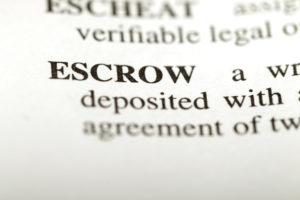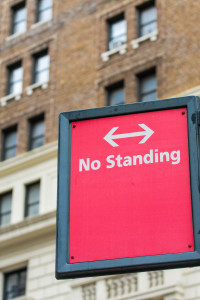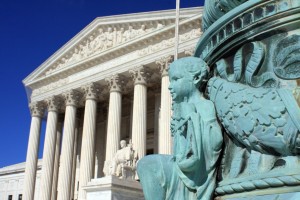** District Court Judge Construes Campbell-Ewald Giving Daylight to Defendants Wanting to Moot Class Claims **
By: Brent E. Johnson
We’ve recently blogged about the door left open by the U.S. Supreme Court in Campbell-Ewald Co. v. Gomez, 136 S. Ct. 663, 193 L. Ed. 2d 571 (2016) for mooting a putative class representative’s claim by the defendant depositing the full amount into an account payable to the plaintiff and the court entering judgment in that amount. In Chen v. Allstate Ins. Co., No. 13-16816, 2016 WL 1425869, at *1 (9th Cir. Apr. 12, 2016), the Ninth Circuit slammed that door shut, saying, in essence, that a trial court should not enter judgment if the class representative rejects a Rule 68 offer of judgment in order to pursue relief on behalf of members of a class even if the offer of judgment affords the individual plaintiff complete relief. 2016 WL 1425869, at *9. As we noted in a recent post about Chen, while the Ninth Circuit distinguished Allstate’s “reversionary interest” in its money from the situation where a defendant deposited the money into a court registry and could not reclaim it, that distinction is without a difference because Federal Rule of Civil Procedure 67 requires notice to the plaintiff and a court order permitting the deposit giving the plaintiff the right to oppose it on the ground that she does not want the money because she (ahem . . . her lawyers) would rather pursue class relief.
This rather tortured analysis about who owns the money after it has left the defendant’s hands but has not been accepted by the plaintiff stems from three 19th century tax cases where the defendants actually paid the amounts allegedly owed to the State of California into bank accounts in accordance with a California statute that required the State to accept payments in full. Under those circumstances, “[T]he railroad’s payments had fully satisfied the asserted tax claims, and so extinguished them.” Campbell-Ewald, 136 S. Ct. at 671. Thus, if the money changes hands, the case is over. This motiff was picked up by the Ninth Circuit in Chen, in which the Court discussed the common law doctrine of tender upon which Rule 68 is based. The Ninth Circuit noted that, under the tender doctrine, “[T]here may have been occasions when the deposit of money in court could be ‘treated as the equivalent of an actual payment to and acceptance by the plaintiff.’” (Citing, Robert G. Bone, “To Encourage Settlement”: Rule 68, Offers of Judgment, and the History of the Federal Rules of Civil Procedure, 102 Nw. U.L. Rev. 1561, 1585 (2008)). Chen, 2016 WL 1425869, at *8. However, the Ninth Circuit concluded that for the deposit of funds to be treated as payment and acceptance, “the defendant [must] unconditionally relinquish[ ] its entire interest in the deposited funds” — in other words, only when “‘the defendant bids his money an eternal farewell.’” (Quoting H. Gerald Chapin, Code Practice in New York 164 (1918)). Id. But it seems a Sisyphean task for a defendant to unconditionally relinquish its funds when the plaintiff won’t take them.
Just last week, however, the United States District Court for the District of Massachusetts found a way for a defendant to “bid [its] money an eternal farewell” in order to satisfy the demands of a putative class representative even when the class representative declines the payment. In Demmler v. ACH Food Companies, Inc., No. 15-13556-LTS (D. Mass. June 9, 2016) (Dkt. No. 48), the defendant manufactured Weber barbecue sauces labeled “All Natural” in large lettering on the bottles. Tragically, these delicious condiments contained caramel coloring. And as sure as the sun does rise, ACH received a Demand for Relief pursuant to Massachusetts General Law, Chapter 93A §9(3) from the plaintiff’s attorney purporting to represent a consumer class. ACH responded with a $75 check (statutory damages, trebled) and a letter that included the statement, in the Court’s words, “[T]hat ‘ACH is willing to offer’ a refund, and characterized the check as ‘the extent of [ACH’s] willingness to compromise under the circumstances.’” Id. at 4. Importantly, the Court noted that “the letter imposed no conditions or restrictions on the check it enclosed, either in the letter or on the face of the check.” Id.
The correspondence battle continued between the attorneys, with the plaintiff’s attorney objecting to the tender because it didn’t provide class-wide relief and ACH asserting that the unaccepted $75 payment mooted the case. Id. The plaintiff then filed suit. In a final flourish, defense counsel sent another $75 check — again without condition or restriction — that was, of course, rejected. It is of some significance that the putative class action did not seek injunctive relief because ACH had stopped labeling its products as “All Natural” eight months prior to receiving the plaintiff’s Demand. Id. at 5. The case was thus limited to compensating the putative class and attorney fees.
The barbecue brouhaha came to an abrupt conclusion when the Court granted ACH’s Motion to Dismiss the case as moot. The Court addressed Campbell-Ewald head on, distinguishing it on the basis that a Rule 68 offer of judgment is a settlement offer while ACH’s twice tender of $75 was a no-strings attached payment. As the Court found, “This distinction makes all the difference.” Id. at 6 – 7. The trio of 19th century tax cases that temporarily vexed the majority in Campbell-Ewald made a brief but important appearance in the Court’s opinion – they were the basis (along with the Supreme Court’s intentionally narrow ruling in Campbell-Ewald) for the Court to hold that “Demmler’s refusal to accept the $75 is immaterial.” “While ACH did not actually deposit the $75 check in an account payable to Demmler [as did the railroads in the 19th century tax cases] . . . ACH delivered the check to Demmler (or, more precisely, his attorney), entitling him to full possession of the $75.” Footnote 5 of the Court’s opinion distills Judge Sorokin’s thinking on the issue: “A defendant might condition, for example, satisfaction on the Plaintiff’s agreement to avoid litigation over whether the claim has become moot. In such a circumstance, the offer, like a Rule 68 offer, does not render the case moot, because that Plaintiff’s is remedied only if it agrees to the mootness determination.” Id. at 8.
After concluding that ACH’s rejected payment to the plaintiff mooted his individual claim, the Court addressed the question of whether ACH’s payment was a pickoff play that might invoke the legally-questionable “inherently transitory” exception to the general rule divined from Justice Kagan’s dissent in Genesis Healthcare – i.e., a claim that is “capable of repetition, yet evading review” may not be mooted by the termination (or, in this case, satisfaction) of the putative class representative’s claim. Without conceding that the First Circuit ascribed to the inherently transitory exception, the Court interpreted First Circuit precedent to require that — if such an exception exists — it does so only when there is some pattern or practice of defense lawyers (either individually or as a group with respect to a specific class of claims) picking off plaintiffs. Therefore, while it may be the practice of defense lawyers to pickoff plaintiffs in TCPA cases, “Demmler has offered no evidence that any ch. 93A defendants, let alone ACH specifically, has a pattern of engaging in such conduct.” Id. at 13 – 14.
What are the lessons of Demmler? First and foremost, that Campbell-Ewald has not resolved the issue of whether paying or offering to pay a plaintiff the full value of her claim deprives her of standing as a class representative. And second, if you’re going to try it, make the payment unconditional and don’t do it a lot.




